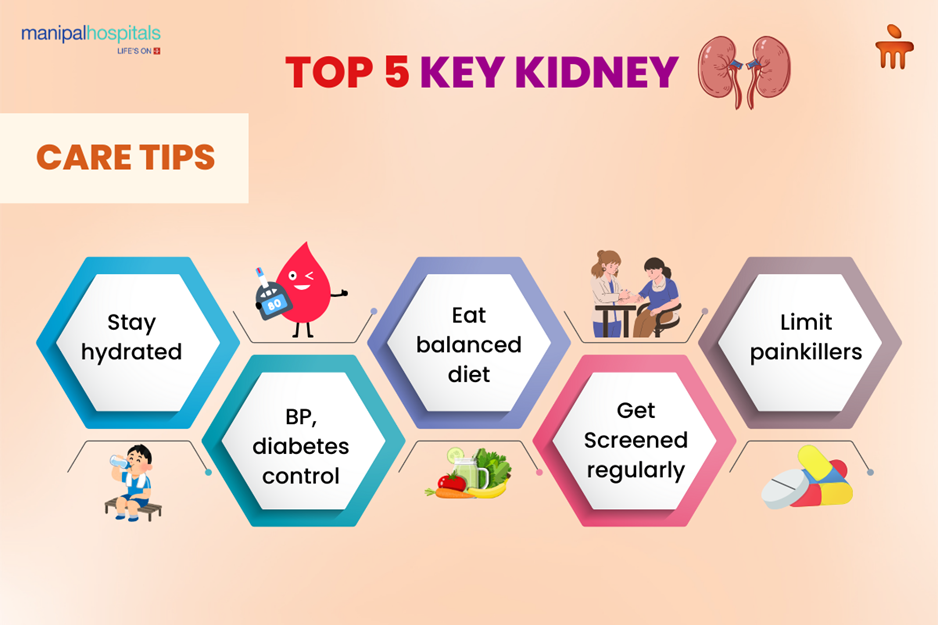
Listen to article
Loading audio...
Currently about 850 million people globally are known to be living with kidney disease. In India the prevalence of chronic kidney disease (CKD) is increasing at an alarming rate, affecting 13.24% of people above age 15. Diabetes and hypertension are significant risk factors for developing CKD, with diabetes causing about 40% of all CKD cases. Early detection procedures and proper management can help prevent kidney failure. In this blog an experienced nephrologist from Doddaballapur, Bangalore offers functional advice, preventive measures for kidney health and discusses the efforts for disease mitigation.
Synopsis
Essential Tips for Maintaining Kidney Health
Kidneys function as important filters of body waste and keep the whole body healthy. However, poor daily choices can lead to kidney disease over time.
Below are essential tips to keep your kidneys healthy:

-
Stay Hydrated: A daily water intake of 2.5 to 3 litres removes toxins while fighting kidney stone development. Proper fluid intake helps maintain kidney performance and protects against infections.
-
Follow a Balanced Diet: Eating fruits, vegetables, and whole grains benefits kidney functioning.
-
Follow a Kidney-Friendly Diet: Limit processed foods, sodium, and excessive protein intake.
-
Treat Infections Promptly: Address urinary tract infections or other illnesses early to prevent kidney damage.
-
-
Avoid Painkillers and Unnecessary Medications: Repetitive usage of NSAIDs and other painkillers can result in kidney damage. You should seek medical advice before taking any medications, particularly if you have existing kidney conditions.
-
Exercise Regularly: Physical exercise promotes blood circulation while reducing the risk factors that lead to kidney disease, including diabetes and hypertension. People should perform physical activity for a minimum of thirty minutes each day.
-
Monitor Blood Sugar and Blood Pressure: Individuals with diabetes or hypertension experience severe problems with their kidney function. Regular monitoring, appropriate lifestyle changes, and correct medication prescriptions can stop kidney damage from developing.
Medications and Kidney Health
Medications impede kidney function when consumed without doctor supervision. Individuals with kidney disease and those who carry risk factors need to exercise special caution regarding their drug use.
Below are key medication guidelines for kidney health:
-
Avoid NSAIDs and Painkillers: Long-term use of ibuprofen, naproxen, and similar drugs can harm your kidneys.
-
Limit Unnecessary Antibiotics: Some antibiotics, like aminoglycosides, can cause kidney damage if misused.
-
Be Cautious with Alternative Medicines: Herbal and Ayurvedic remedies may contain harmful substances affecting kidney function.
-
Take Nephroprotective Drugs if Advised: Medications like probiotics, alpha-keto analogues, and N-acetylcysteine help protect kidney health.
-
Regular Kidney Check-ups: Routine tests help monitor medication effects and detect early signs of kidney issues.
Consult the nephrology department in Manipal Hospital at Doddballapur, Bangalore to formulate a personalised treatment plan for combating CKD.
Warning Signs of Kidney Problems
Kidney diseases often progress silently, showing symptoms only in later stages. Early detection helps prevent severe complications and kidney failure.
Below are the key warning signs of kidney problems:
-
Facial Puffiness: Swelling around the eyes or face, especially in the morning
-
Foamy Urine: Excessive bubbles in urine, indicating protein leakage
-
Blood in Urine: Pink, red, or dark urine may signal kidney damage
-
Unexplained Weight Loss: Sudden weight drop without changes in diet or activity
-
Loss of Appetite: Reduced hunger due to toxin buildup in the body
-
Breathlessness: Shortness of breath caused by fluid buildup or anaemia
-
Decreased Urine Output: Less frequent urination or minimal urine production
-
High Blood Pressure: Uncontrolled hypertension can damage kidneys over time
-
Back or Side Pain: Persistent pain around the lower back or sides near the kidneys
Conclusion
You should see a doctor if you experience facial puffiness, foamy urine, blood in urine, breathlessness, or reduced urine output. People with diabetes, hypertension, or a family history of kidney disease need regular checkups. Those with chronic kidney disease should monitor kidney function every three months.
FAQ's
Yes, chronic stress can raise blood pressure, which increases the risk of kidney disease over time.
Excessive alcohol intake can dehydrate you and strain the kidneys, increasing the risk of kidney disease and high blood pressure.
Some kidney diseases, like polycystic kidney disease, run in families. Regular screenings are essential if you have a family history of the disease.
Severe dehydration reduces the blood flow to the kidneys, potentially leading to acute kidney injury.
Frequent urination, especially at night, is an early sign of kidney issues. However, an experienced nephrologist needs proper evaluation to determine the exact cause.



















 5 Min Read
5 Min Read









